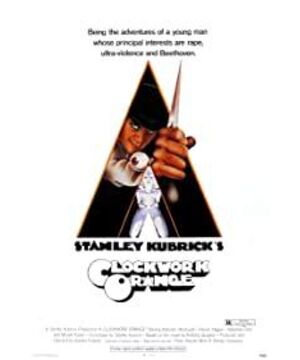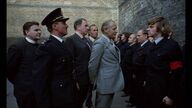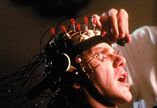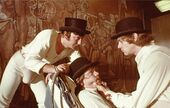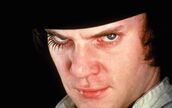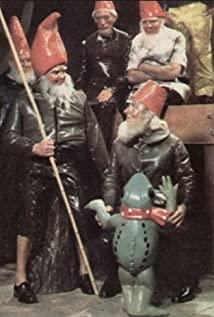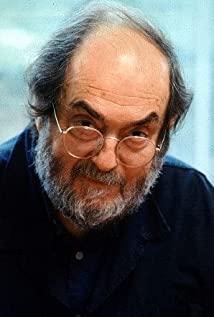Kubrick's films are always full of realism grotesques. From the sci-fi fantasy of "2001: A Space Odyssey" that is surprisingly consistent with the future, to the completely realistic description of the battlefield in "Full Metal Shell", to the real to terrifying suffocation in "The Shining", this has almost become Kubry. The unique mark of this master of art. "A Clockwork Orange" is no exception. The background is England in the 1970s, when the punk movement swept the country. The description of a few young people who were still students at school seemed to bring people back to that crazy and chaotic era. As always, the violent descriptions and exaggerated lens performance of the protagonists are so absurd. It is precisely these extremes of extreme realism and extreme absurdity that enhance the artistic expression of the film and arouse viewers' in-depth exploration and thinking of the film.
The punk movement undoubtedly sparked a wave of rebellion in Britain and even Europe in that era, but it is rare to see many evildoers like the protagonists in "A Clockwork Orange". They are obviously different from the young people who took to the streets to fight for "Anarchy in UK" with the yelling "God Save the Queen" of Sex Pistol. Evil and violence almost flooded their ordinary lives.
In a crime of entering a room and hurting others, the protagonist Alex was discovered by the hostess. After fighting, the hostess finally died. The revolving camera humorously recorded this originally cruel process. Under the funny music, the protagonist Alex is holding the ridiculous white sculpture of the hostess's house: a huge model of male genitals, circling the hostess. After several collisions, the hostess died. This highly symbolic scene seems to imply Kubrick's thinking about the nature of violence. Representing unrestrained violence, Alex brutally and somewhat jokingly hurt the mistress who is unable to fight back, but the murder weapon in his hand implies the mistress’s own subconscious imagination and pursuit of violence and sex: the perpetrator is in Games and unintentional violence, but the victim is hurt by the abuser using his own inner pursuit.
If the protagonist in Kubrick's movies is always so different, then Alex is the most special one. In order to portray such a complicated character in the shortest possible length, a classic segment that made this film remembered by countless people was born: in a scene of walking along the riverside, Alex pretended to be challenged by his peers for his leadership position. He had reconciled with his companion, but suddenly raised his foot and kicked a companion into the water. Then he kicked another companion who was trying to intervene in the water. Then he squatted down and extended a "helping" hand to his companion who fell into the water, but drew a knife from his sleeve behind him. A long blood trace was drawn on the hand of his companion. Such a scene was filmed by Kubrick with a high-speed camera, as if it turned into a beautiful dance in slow motion. Rossini's opera "The Thief Magpie" played with this violent performance throughout, turning this absurd scene into a wonderful violent performance. The picture freezes, a wild and evil face, charming blue eyes, long golden hair, sly smile... The close-up of Alex's face while pulling the knife secretly behind him is unforgettable.
The original authors Anthony Burgess and Kubrick obviously didn't want to portray Alex as a simple villain. In addition to violence and sex, Alex has another hobby: Beethoven. He admired Beethoven, a great artist, and he personally taught companions who tried to insult strangers who praised Beethoven. After returning home from a series of evil deeds during the day, he bathed and changed his clothes, immersing himself in the music world of Beethoven. He imagined the crucifixion of Jesus in music, but his mind was full of violent and bloody images. If Alex does not accept the religion that can teach ordinary people, then obviously Beethoven (rather than representing a kind of primitive beauty in art) has become the only faith in his life.
Alex in prison has undergone various reforms and education. The rigorous discipline of the prison did not make Alex change his way: forced to look through the Bible in the library, Alex actually imagined the nude of the Virgin. It can be seen that the conventional method cannot eliminate the evil in Alex's heart. After being detained for a few months, the judiciary developed a bold "crime treatment" method, and they decided to use Alex as an experiment. Alex was taken away and told: as long as he passes the experiment, he is free. The content of the experiment is like this. Alex is forced to watch videos full of violence and pornography for several hours every day. His eyes are hooked by hooks and cannot be closed. He is also injected with a drug that can cause adverse reactions. Form a conditioned reflex. From then on, as long as I think of violence and sex-related things, I feel uncomfortable and vomit. Ironically, this treatment not only caused him physical and mental pain, but also destroyed his bottom line of survival. The experimenter added "Beethoven's Ninth Symphony" as background music to a black and white video of Nazi violence. Alex cried out in pain: "Don't be Beethoven! He's not wrong!" At this moment, looking at the extremely painful Alex and the indifferent doctor, I believe that every viewer begins to question the true meaning of violence and evil. But the film did not leave the audience time to think, and continued the following plot with a unique fast pace.
After several months of treatment, a "villain" disappeared from the world, replaced by a cripple "good" person whose faith was trampled and who had lost the ability to resist all external infringements. In the next part of the film, the story of Alex after his release from prison is continued in almost the same order as in the first half of the film: revenge by the old beggar who was beaten by him, beaten by a few of his colleagues who are now policemen, and he was beaten by him. The injured male writer caught and frightened. The frightened Alex jumped out of the window and escaped. He was seriously injured and was taken to the hospital. This is different from the karma preached in religion. Alex was injured in the same image as the previous victims as a weak person who had lost the ability to resist. The beggar old man who once complained that the world had lost the standard of good and evil when he was beaten by Alex, the policeman who was responsible for maintaining social stability and resisting violence, the old writer who wrote incompetently at home for a long time, faced Alex who was unable to fight back. , They also raised their clenched fists. The film uses such a seemingly reasonable plot arrangement, which undoubtedly accuses every ordinary person of violence.
Kubrick himself once said: "The subject of the film questions people’s sense of freedom. Everyone must live according to fixed ways and principles. When the right to choose a good or a bad person is deprived, will people still enjoy it? Human rights?" The film will be directed at social ideology without mercy, and both free will and social ideology will be extremely extreme. Regarding violence and restraint, the film puts forward a powerful proposition: deprive a person of the right to choose to do evil. Regardless of free will forcing others to do good, and respect for people's laissez-faire and the spread of evil, which one is better?
Good and evil seem to blur the boundaries in this film. I think we have to apply the words of the school pastor who tried to teach Alex in the film: kindness is the choice of people. When a person cannot choose, he is no longer a person.
Freedom and violence are two things that mankind has always been exploring. The film seems to propose a new explanation: Violence itself is the essential pursuit of human beings, and it is the embodiment and source of freedom in everyone's heart. Just like the suggestive ending of the film, two rows of men and women dressed in 17th-century costumes applaud and smile when facing a mating couple. Alex's off-screen sound began: "I was cured, all right." How to resist violence, the film did not give us the answer. Only the monotonous end credits are left.
On the way to explore human nature, Kubrick left the heaviest step in "A Clockwork Orange." When the most essential constraints of human civilization are threatened, what do we use to appeal to ourselves and the future? A panic that is heavier than the nuclear war that would destroy the world in "Dr. Strange Love" is brought, and the repeated questioning is the most powerful cry in this film: Where will humanity eventually go?
View more about A Clockwork Orange reviews


